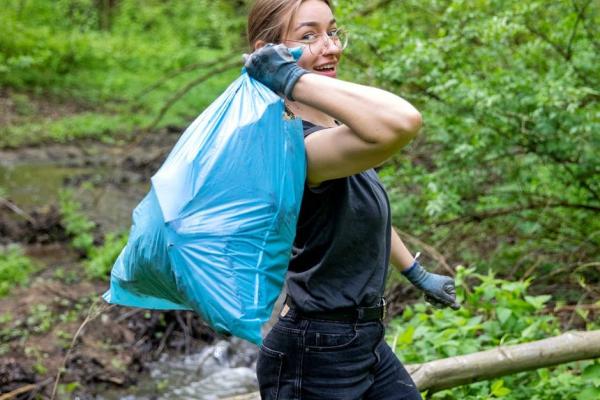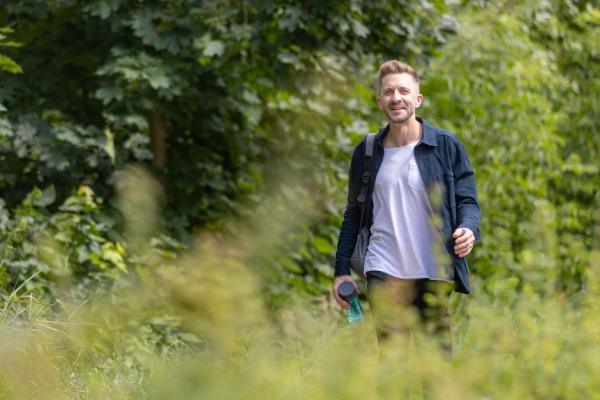Goda comes from a background in cinema and, more generally, in the cultural sector, while Agnė has a background in public health. Their paths crossed when they felt a desire to create something that could address both environmental challenges and social needs. About a decade ago, they gathered with a group of local women and founded Miesto Laboratorija as a space where sustainability, education and community engagement could come together. “We wanted to create a place that would not only raise awareness about climate change but also empower residents to take action in their daily lives,” they both said.
Contributing to environmental innovation
At Miesto Laboratorija, numerous activities and events are organised. This collective space serves as a hub for environmental innovation and civic participation. It includes a restaurant, an educational garden and various public programmes designed to engage people in sustainable practices. In addition to this, workshops, events and community projects are also organised, such as local clean-ups, food waste reduction programmes and flea markets. A key part of their work is fostering community ownership, with many activities proposed and led by the people who frequent the laboratory. This helps to ensure that Miesto Laboratorija remains responsive to the needs of the local community and creates a sense of collective responsibility in the fight against climate change.
The most significant challenge is maintaining long-term engagement and behavioural change. While many people are passionate about sustainability, shifting everyday habits and making long-lasting changes can be difficult, especially when faced with the daily pressures of modern life. Another challenge is managing resources. As a self-sustaining social business, Miesto Laboratorija relies on the income generated by the restaurant to fund its sustainability programmes. This model keeps the system agile, but it also means that the two founders must constantly balance the financial side of things with their environmental goals. Despite these challenges, Goda and Agné are strongly motivated by the small but meaningful changes seen in people’s lives, whether it's through adopting sustainable habits or getting involved in community-driven initiatives.
Insights from Vilnius as European Green Capital 2025
“We are incredibly proud that Vilnius has been named the European Green Capital for 2025,” the two colleagues explain. According to them, it’s a massive recognition of the city's commitment to sustainability, and they believe it’s a step in the right direction for creating a greener, more sustainable future. “Green spaces play a crucial role in this transformation. They provide more than just aesthetic value — they help to mitigate the urban heat island effect, improve air quality and offer residents a place to connect with nature,” they insist. For both of them, this serves as a reminder of the importance of integrating green spaces into urban planning. Vilnius has made significant strides in expanding its cycling infrastructure, enhancing public transportation and increasing the number of green areas, all of which contribute to making the city healthier and more sustainable for its residents.
Sources of daily motivation
Both Goda and Agné’s motivations come from the tangible impact they see in the community. There is nothing more rewarding than observing someone adopt a new sustainable habit, return to volunteer or share an idea for a new project that will make a difference. They are also motivated by the recognition that their work contributes to the larger goal of creating a more sustainable, inclusive urban environment. Both of them have deep roots in Vilnius, and they want to ensure that the city they leave behind is one where future generations can thrive. “This sense of responsibility and knowing that even small changes can have a big impact keeps us going,” they explain.
Getting citizens more engaged in climate action
According to the two interviewees, the most important thing is to incorporate sustainability into daily life. Simple actions, such as using reusable containers, reducing food waste, or taking part in local clean-up events, can make a significant difference. It’s also important to get involved in community activities and initiatives. “At Miesto Laboratorija, we’ve seen firsthand how powerful it is when people come together to work toward a shared goal,” they note. Whether it's attending a local event, volunteering, or simply discussing sustainability with friends and family, every action counts. They believe that when people see visible, immediate results — like a cleaner park or reduced waste production — they are more likely to stay engaged.
Goda Sosnovskienė and Agnė Gaisrė’s work at Miesto Laboratorija exemplifies the power of community-driven action in the fight against climate change. Through their tireless dedication to sustainability and local engagement, they are helping to shape a greener, more inclusive future for Vilnius. Their story serves as a reminder that meaningful change begins at the grassroots level and that everyone has a role to play in creating a sustainable world.
Citizen Diaries - Vilnius

Rugilė Matusevičiūtė is a sustainability advocate and EU Climate Pact Ambassador in Lithuania for over a year, she is a multi-skilled content creator and communicator.

Meet Goda Sosnovskienė and Agnė Gaisrė, co-founders of Miesto Laboratorija, a community-driven initiative in Vilnius that promotes sustainable living through environmental innovation.

Silvestras Dikčius, a climatologist and influential communicator in Lithuania, has dedicated his career to raising awareness and promoting action on climate change and sustainability.



